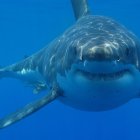Experts say at least 13 sharks tested positive for cocaine off the coast of Brazil
Although studies are not thorough, researchers suspect that the effects of drugs on the behavior of sharks are similar to those caused in humans.

Sharks in Brazil
Marine biologists in Brazil reported that at least 13 sharpnose sharks caught off the coast near Rio de Janeiro were analyzed and found to have high levels of cocaine in their muscles and livers.
The research project, carried out by the Oswaldo Cruz Foundation and reported by the BBC, is the first to detect the presence of cocaine in sharks.
"The concentrations were as much as 100 times higher than previously reported for other aquatic creatures," BBC explained.
Likewise, the news network detailed that experts believe the cocaine is reaching the water through illegal laboratories where the drug is manufactured or through the excrement of drug users.
In addition, packages of cocaine lost or dumped by traffickers at sea could also be a source. However, the researchers consider this hypothesis less likely.
In that sense, although studies are lacking, the researchers intuit that the effects of drugs on the behavior of sharks are similar to those seen in humans.


























